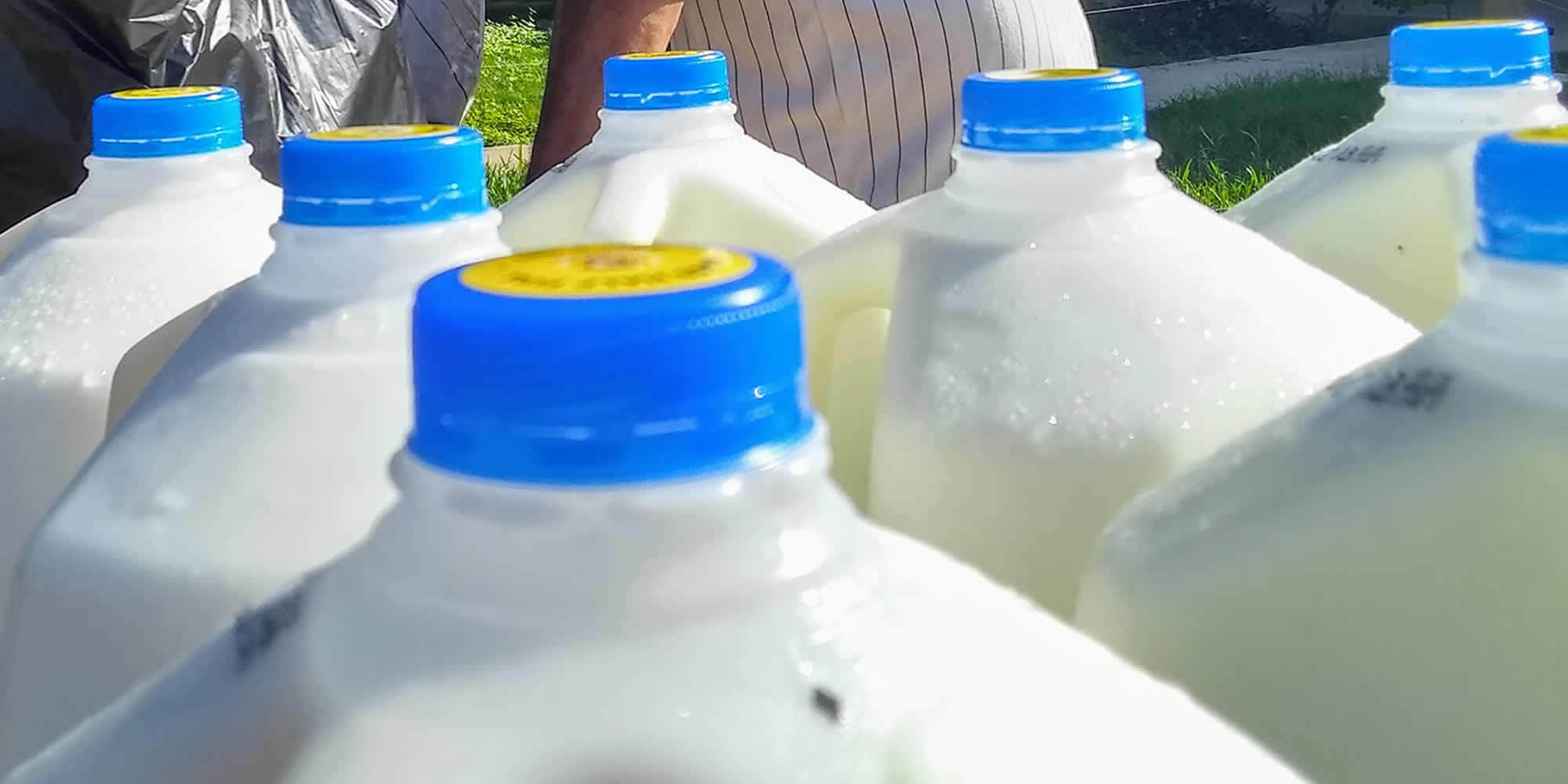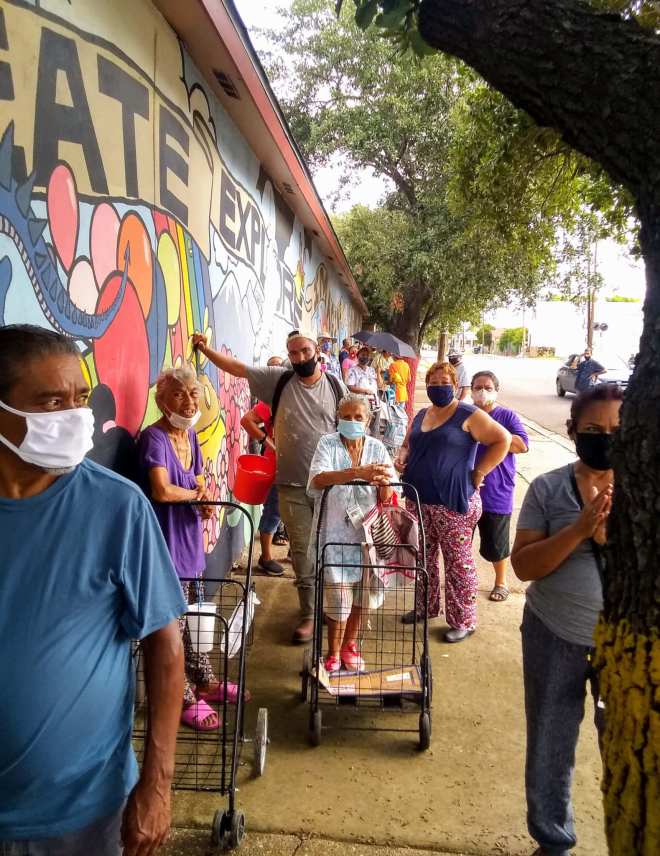
UMCOR grants help Holding Institute save money and increase service
By Christie R. House
September 2020 | ATLANTA
When Michael Smith, a UMC licensed local pastor and executive director of Holding Institute Community Center in Laredo, Texas, heard about COVID-19 in the United States in mid-March, he figured his community would eventually be affected by the pandemic. He had no idea then that Texas would be hit so hard by COVID-19 in June and July or that the economic fallout would affect so many.

PHOTO: HOLDING INSTITUTE
“We had anticipated an increase in the need for service, but not by this much.” he said. “COVID-19 has caused higher rates of unemployed and underemployed workers and higher numbers of people seeking emergency food assistance. We used to distribute food on Tuesdays and Thursdays just in the early morning. Now we distribute all day.”
The Laredo community, on the U.S.-Mexico border, is about 98% Hispanic. The unemployment rate in Laredo before the COVID-19 pandemic was already above the state average. The rate of uninsured people even then was 30%. Today, Holding Institute provides food every week for 226 households, representing about 1100 individuals.
Fortunately, two years ago Holding Institute started working with the NAACP, United Methodist Women, and the United Methodist Committee of Relief on a project called El Sol Community. The community center sought to benefit from the hot Texas sun by installing solar panels to relieve some of the burdens of utility costs. The installation was completed earlier in the year, and the cost savings it has already provided couldn’t have come at a better time.
Equity means access for all people
Founded in 1880, Holding Institute is one of United Methodism’s National Mission Institutions in partnership with United Methodist Women. From its beginning, it has served Laredo’s immigrant community. It began as a school to provide Hispanic children with academic opportunity at a time when they were not allowed to enroll in Laredo’s public schools. Eventually, the institute transitioned to become a seminary and then to a small educational center.
Today, Holding is a community center, an emergency shelter and a place to find transitional housing. Working for justice and equity in the labor force, the center offers workforce development and placement, training and counseling. To address health needs, the center has a nurse on staff and access to a psychologist. But a lot of the work is powered by volunteers.
Smith noted that Holding Institute had been looking at solar energy for some time, but the cost to install a solar array was prohibitive for the nonprofit service agency. In 2018, he traveled to Columbus, Ohio, to attend the Women’s Assembly, a United Methodist Women’s event that occurs every four years. There, he came across an NAACP information booth that featured a “solar equity” program.
“UMW opened the gateway to contact NAACP to then reach out to UMCOR, and we worked together as partners,” said Smith. The key factor for Smith was the equity piece. Holding Institute would be the first historic building in Laredo with solar capability. It is also one of only two National Mission Institutions in the U.S. to go solar. UMCOR provided grants for the solar hardware and construction and another for a restaurant-style refrigerator.
After crews finished the installation, inspectors came through and permission was granted to turn on the panels.
“The day we flipped the switch the solar panels immediately began to power the facility,” Smith continued. “We had just purchased the large refrigerator. We filled it with milk for the first time – 100 gallons, powered by solar energy. The milk was cool and fresh. We had never had the capacity to distribute milk before.”
The first utility bill after that showed a 25% reduction in cost. As the solar array is fully implemented, Smith expects a 40% reduction going forward. Just a month after the solar panels were integrated into the electrical system, the community center could supplement the staples of pasta, rice and beans in their food boxes with fresh fruit, vegetables and milk, when available.
Smith says the benefits of solar energy are not theoretical. “El Sol Community has produced a clear, direct impact we can see.”
Light for the Future
For UMCOR, El Sol Community is a strategic response to the challenges that emerge at the intersection of migration, climate change and affordable energy access. “The changing climate means hotter temperatures and greater need for cooling in already hot places,” said the Rev. Jenny Phillips, senior technical advisor for Environmental Sustainability at Global Ministries.
“Migration is increasing with climate change and as people flee from conflict over resources in search of arable land,” Phillips continued. “Organizations like Holding Institute that serve migrant communities on the border are serving more immigrants in hotter temperatures, which means high energy consumption and bills. Using solar to carry some of that energy burden means this ministry can grow without dumping more greenhouse gas emissions into the atmosphere – emissions that would exacerbate the challenges Holding seeks to address.”
Phase one of the project was the installation, phase two, implementation, and a third phase, training community members to install and manage a solar system, has been delayed by COVID-19 restrictions in Texas. The original plan included onsite training to give low-income Hispanic residents access to better paying “green jobs” in response to an anticipated rise in the demand for solar energy products.
The community center hasn’t given up on phase three. Smith is looking into the possibility of virtual training. Providing this kind of access to better jobs that also contribute to a better environment for minority populations is part of United Methodist Women’s “Just Energy for All” program and Global Ministries’ Environmental Sustainability work.
God answers prayer in surprising ways
Smith admits he wasn’t sure the partnerships for El Sol Community would all come together, but he also knows that God sometimes answers prayers he didn’t even know he was praying.
Just recently he was talking with the Holding warehouse manager. They weren’t sure how long the food stocks would last if they kept pace with demand for the 30 lb. emergency food boxes they packed. They had to make the difficult decision to cut the weight to 25 lbs. Yet, grocery stores in the area still had empty shelves.
Then Smith went home and turned off his phone to spend time with his 4-year-old daughter. A friend called to say he could arrange shipment of a truckload of food if Holding needed it, but he had to know right away. Smith missed the call. Later that evening, he called to apologize. But his friend said, “I figured you needed it. I said yes for you. The truck will be there tomorrow morning.”
“God moves in ways we can’t comprehend or quantify,” said Smith. “We are blessed by seeing people work together and reach out across denominational divides. El Sol Community represents a sustainable hope where sometimes little hope is apparent.”
Christie R. House is a consultant writer and editor with Global Ministries and UMCOR.

